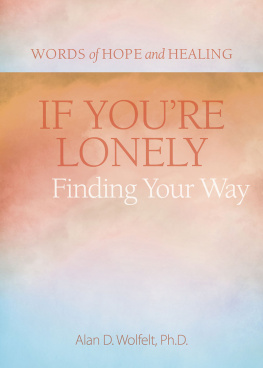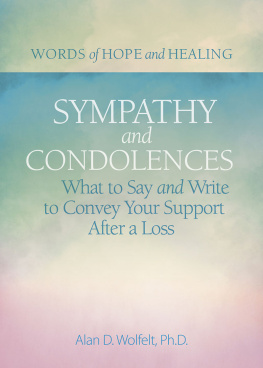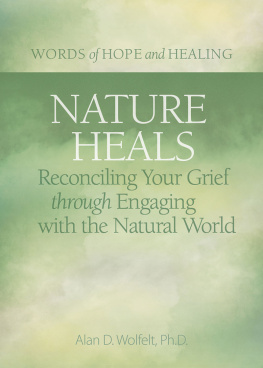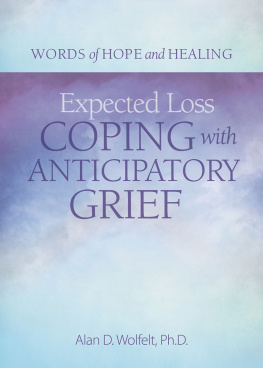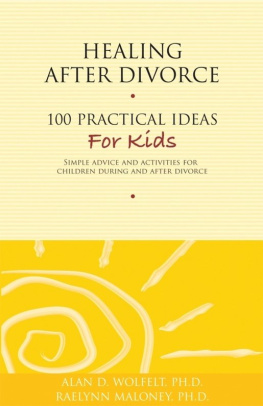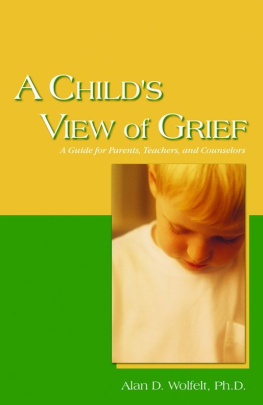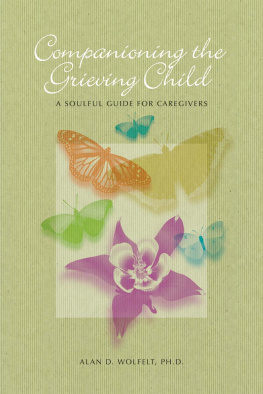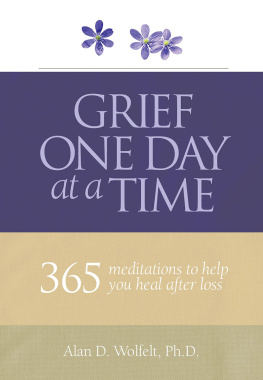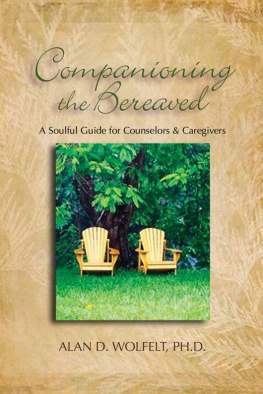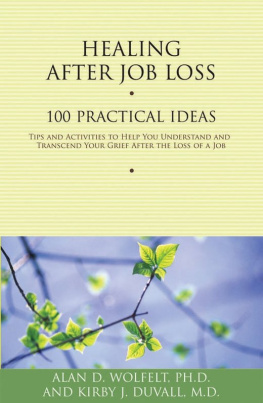Alan Wolfelt - If Youre Lonely
Here you can read online Alan Wolfelt - If Youre Lonely full text of the book (entire story) in english for free. Download pdf and epub, get meaning, cover and reviews about this ebook. year: 2020, publisher: Companion Press, genre: Religion. Description of the work, (preface) as well as reviews are available. Best literature library LitArk.com created for fans of good reading and offers a wide selection of genres:
Romance novel
Science fiction
Adventure
Detective
Science
History
Home and family
Prose
Art
Politics
Computer
Non-fiction
Religion
Business
Children
Humor
Choose a favorite category and find really read worthwhile books. Enjoy immersion in the world of imagination, feel the emotions of the characters or learn something new for yourself, make an fascinating discovery.
- Book:If Youre Lonely
- Author:
- Publisher:Companion Press
- Genre:
- Year:2020
- Rating:4 / 5
- Favourites:Add to favourites
- Your mark:
- 80
- 1
- 2
- 3
- 4
- 5
If Youre Lonely: summary, description and annotation
We offer to read an annotation, description, summary or preface (depends on what the author of the book "If Youre Lonely" wrote himself). If you haven't found the necessary information about the book — write in the comments, we will try to find it.
If Youre Lonely — read online for free the complete book (whole text) full work
Below is the text of the book, divided by pages. System saving the place of the last page read, allows you to conveniently read the book "If Youre Lonely" online for free, without having to search again every time where you left off. Put a bookmark, and you can go to the page where you finished reading at any time.
Font size:
Interval:
Bookmark:
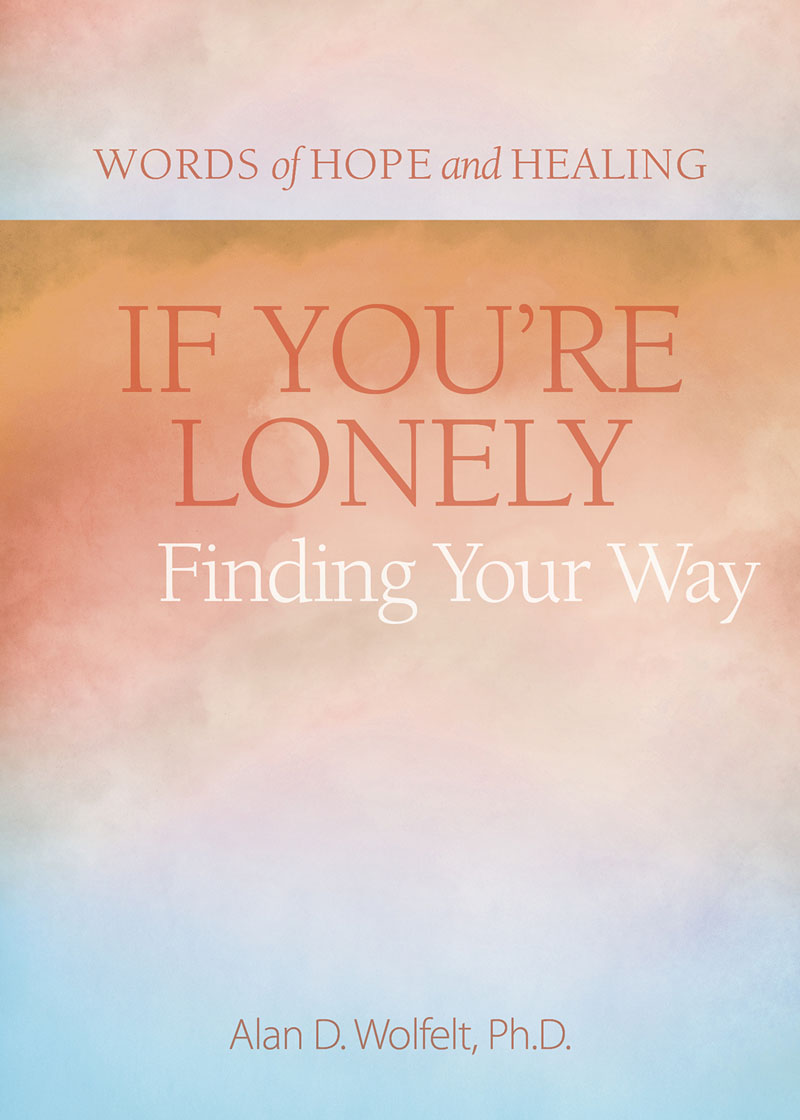
2020 by Alan D. Wolfelt, Ph.D.
All rights reserved. No part of this publication may be reproduced, stored in a retrieval system, or transmitted in any form or by any means, electronic, mechanical, photocopying, recording, or otherwise, without the prior permission of the publisher.
Companion Press is an imprint of the Center for Loss and Life Transition, 3735 Broken Bow Road, Fort Collins, Colorado 80526.
25 24 23 22 21 206 5 4 3 2 1
ISBN: 978-1-61722-297-9
The eternal quest of the individual human being is to shatter his loneliness.
Norman Cousins
Loneliness hurts. It may feel like a twinge, a yearning, or an emptiness. It might be more pronounced at certain times than others, or it may be a constant dull ache.
Human beings are social creatures. While each of us is a capable, autonomous individual, we are not meant to exist for very long individually. Since time began, weve lived in social groups. We are built to interact with and rely on others. As a species, we developed highly complex languagesspoken and writtenfor the purpose of communicating with one another. We divvy up tasks and specialized skills among us because we appreciate that living well is a community effort.
Neurologically, we are also constructed to understand each others emotions. We have mirror neurons in our brains that fire not only when we ourselves have a certain experience but also when we witness or hear about someone else having that same experience. We are built for empathy, connection, and love.
If you have been feeling lonely, whether all of the time or some of the time, this book is for you. Its possible to find your way out of loneliness. You are a worthy person who needs and deserves connection.
To connect to others is a biological need. It ties back to the idea that to be a part of a group is adaptive to survival.
Aspen Ideas
One of the great ironies of human life today is that even though there are more of us on this earth than ever, and even though technology has theoretically given us more ways to be connected with one another than ever, many of us have never felt more alone.
We are in the midst of a loneliness epidemic. Its a crisis that cuts across cultures, continents, and classes. Britain has added a Minister for Loneliness to its federal government. In the United States, thirty-five percent of adults over the age of forty-five report feeling lonely. In one recent Cigna survey, over half of Americans said they always or sometimes feel that no one knows them well. And young people are lonely, too. Some studies have found that Millennials and Generation Z are the loneliest of all.
Thats the grand scale of the problem. The intimate, personal scale of the problem is the one you may be all too familiar with. Thats what were here to talk about: your loneliness, and what you can do about it.
Loneliness is the feeling of being empty, alone, and unwanted. Its the discomfort or pain of wanting connection with other human beings but not having it. Its an internal response to an external experience (or lack thereof).
Well tease apart the various facets of loneliness in a bit, but for now Ill just say that from the outside looking in, loneliness is often invisible and undetectable. Not everyone who is lonely is alone. Some lonely people live in chockfull apartment buildings in New York City. Some lonely people work in offices or places with dozens or hundreds of coworkers. And some lonely people seem to have full lives and many friends.
The bottom line is that if you feel lonely, you are lonely. And there are ways to break through your particular loneliness, no matter its causes or qualities. There is hope, and there is help. Though you feel lonely, you are not alone.
Have you felt ashamed or embarrassed of your loneliness? This is common because as a culture we tend to associate loneliness with a failure of interpersonal skills, a lack of strength, or a weakness of character. This unfair and inaccurate stigma can get compounded by ageism. When older people are lonely (and they are, in staggering numbers), it tends to be an unseemly topic that we dont want to examine or talk about.
But you and I are here to talk about it. In our world today, loneliness is a normal human response to isolation. Its largely caused by the structure of modern societynot by the actions, inactions, or inherent qualities of individuals like you. In other words, its not your fault. Loneliness is not a personal failing or character flaw.
I hope this book will help you grow more comfortable with acknowledging and understanding your loneliness as well as expressing and easing it. We have to get better at talking about uncomfortable feelings. Only through honest awareness and open discussion can we find ways to create a healthier, connected culture.
Loneliness rates have doubled in the United States in the past fifty years. Why?
One reason is that people used to live in households comprised of multiple generations, sometimes with grandparents, parents, aunts and uncles, and children all living together. Today generations are separated into their own households (though in recent years this trend is starting to reverse somewhat). Nearly a third of American seniors age sixty-five or older live alonedouble the percentage of most other countries. In addition, marriage is becoming less common, and couples are having fewer childrenor no children at all.
Rising isolation in the home has taken hold concurrent with the rise in technology. In lieu of face-to-face conversation, we now rely on email and texts to communicate with one another. And instead of visiting local shops, restaurants, and banks, we now order online, have our goods and food delivered, and swap digital currency.
Social media is part of this technology tsunami, of course. Facebook, Instagram, Twitter, and other digital social networks are taking the place of the downtown evening stroll, the Saturday night dance, and the community potluck. And while theyre highly effective at some things, such as quickly sharing news and uniting people who are physically distant, social media platforms are sorely lacking in physical presence, facial expressions, tone of voice, and personal warmth.
Workplaces, too, used to be more interactive. Before everyone became glued to computer screens, people worked more closely with one another. Think of the old country doctor versus todays general practitioner, who is forced to gaze into her laptop more than into the eyes of her patients. Or consider the grocery store, where self-checkout is fast replacing human checkers. Or the technology industry itself, which is now divesting itself of workplaces altogether and instead dispersing many employees to work remotely in their own homes.
Here in America, we are also infected by the ideal of rugged individualism. Coined by Herbert Hoover in 1928, this term encapsulated the misguided notion that individuals should be self-reliant and independent, not counting on others for support. And long before that, woven into the very foundation of our country, was the Puritan belief in self-restraint and stoicism. The trouble is, if you keep your emotions to yourself and believe its wrong to rely on others, loneliness is a natural byproduct.
The societal causes of the loneliness epidemic will not be quickly remedied. For now what we can do is work to understand them and support policy and process changes that move us in the direction of meaningful connectedness and mutual reliance. On a personal level, though, there are many things we can do to help with our loneliness. Well be talking about those soon.
Font size:
Interval:
Bookmark:
Similar books «If Youre Lonely»
Look at similar books to If Youre Lonely. We have selected literature similar in name and meaning in the hope of providing readers with more options to find new, interesting, not yet read works.
Discussion, reviews of the book If Youre Lonely and just readers' own opinions. Leave your comments, write what you think about the work, its meaning or the main characters. Specify what exactly you liked and what you didn't like, and why you think so.

